- Home
- Linda Lael Miller
Tonight and Always Page 2
Tonight and Always Read online
Page 2
Presently Kristina looked up, blinked several times, and saw her reflection in the murky surface of the large antique I mirror she'd purchased in Hong Kong. She looked just as she had for upwards of a hundred years, except that she'd worn her dark hair long before the nineteen-twenties, like everyone else. Her skin was still unwrinkled, and her figure remained slender and supple.
Pretty good, she thought, with a slight and rueful smile, for a woman of my maturity.
Kristina shifted her attention from her image to the ornately ugly contours of the mirror itself, pressing the back of one hand to her face. She'd gone traveling after her husband Michael's death in the 1890s, roaming the world like a restless wind, never staying in one place for long. One bleak and rainy afternoon she'd found the piece in a seedy back-street shop and bought it.
To this day Kristina had no idea why she'd wanted the monstrosity. She'd done a number of strange things after Michael was killed—and many of her experiences and emotions were recorded, in great detail, in the letters she held. Miss Phillips's private nurse, engaged by Kristina, had returned her letters after the old woman succumbed to pneumonia in 1934.
A distracted thought flitted through Kristina's mind: She ought to clean the mirror and have it moved to her exclusive and suitably snobbish little antiques and fine art shop on Western Avenue. One woman's junk invariably proved to be another's treasure, as the success of Kristina's business proved.
The correspondence resting in her fingers reclaimed her attention, and with uncommonly awkward fingers she opened the first envelope. The fragile paper was turning to dust, and Kristina held it carefully. Reverently.
The faintest scent of lemon verbena, the fragrance she'd favored then, rose delicately from the vellum, arousing other remembrances, effectively carrying Kristina back to a time that no longer existed for her…
Cheltingham Castle
Somerset
June 14, 1897
My very dear Phillie,
By now, I know you will have heard of Michael's death, but I find I must recount all of it, as I could to no one else, in order to lay down some of the burden. A mortal's death is a mere trifle to my parents, though they have respected my pain and grief and done what they could to lend me comfort, but their kindness does not reach deep enough to soothe the bruises upon my spirit. As for Valerian, who is, as you are well aware, my confidante and friend—well, suffice it to say I believe he secretly thinks me better off without Michael. He always believed my husband was weak, and thus utterly unworthy of my affections. He would, of course, have had that same opinion of virtually anyone, for such is his devotion to me.
Valerian could never understand, as you always have, beloved Phillie, that one need not be especially worthy to be cherished by another. So often love simply occurs, all on its own, like an earthquake or a case of the grippe, and to seek rhyme or reason in such an event is to seek in vain. That, of course, is how it was with Michael and me.
But I must start at the beginning, if I am to tell the tale properly…
My memories spin so beautifully in my mind just now, Phillie, bright-hued and vivid, brimming with sorrow and joy and all the emotions in between. Life is, as you always asserted, rife with paradoxes.
I was already twenty-two the day I met Michael Bradford, an old maid by anyone's standards. You had long since gone to live with your sister, far away in Boston, and I had completed my formal education in Switzerland and London. I visited you sometimes, though I was careful not to draw your notice, out of fear that I might frighten you. I had not yet learned to trust my magic in those days, and there are times when I doubt it still.
But I digress.
I was alone at Refuge, my parents' cottage near Cheltingham Castle, except for the servants, and it had been raining all that morning. The house, spacious as it was, seemed close and dark, and I was fitful, with the beginnings of a headache throbbing in my temples. Just after lunch the blessed sun came out at last, and I asked a groom to saddle my pony, Pan, thinking a ride would clear my muddled brain.
Pan, you may recall, was a wretched beast, spawned no doubt in some corner of hell where the devil himself will not venture, and we hadn't traveled a mile before he'd pitched me headlong into the ditch alongside the road. I was not injured, but my favorite riding habit, a lovely gray velvet with a divided skirt to match, was torn and muddied beyond repair.
I was livid and barely resisted the impulse to turn that odious creature into a tree stump teaming with termites as he raced back toward the stables at Refuge, where the stable hands would no doubt reward him for his villainy with grain and perhaps even a lump of sugar. It was the way of grooms, I supposed, standing there covered in wet din, my hair straggling and my hat still floating in the ditch, to care more for horses than for people.
I could have willed myself home, or exchanged my spoiled garments for fresh ones in a twinkling, of course, but even then I liked to do things in the ordinary human way, wherever possible. You taught me that, Phillie, that I was more mortal than monster, and may heaven bless you for it. (And for so many other kindnesses that I can't begin to count them.)
Michael came round a bend in the track, mounted on a spectacular dapple gray gelding, just moments after I'd shouted a particularly ungracious malediction to the retreating Pan. I had known Michael to be a pest and a bully when we were children—he was the second son of the Duke of Cheltingham, and his resentment of his elder brother Gilbert's splendid prospects had fostered a corresponding nastiness in his nature—but there could be no denying now that he had changed.
Or so I thought, at the time, in my naïveté. Even though I was unquestionably a woman grown by then, I had led a very sheltered life, as you are certainly aware, and there was so much I did not know.
Michael had grown into a spectacular man, with golden hair and eyes of the palest green—just the color of the tree-shaded pond behind our house. He sat his horse well, for he, like most young men of his social class, had spent virtually every free moment in the saddle from earliest childhood, and was an expert rider. I knew from the servants' gossip that he won every race he entered, that he drank and gambled with a vengeance, and had been put out of several schools for unseemly behavior.
He had many shortcomings, my Michael—there is no denying that. Being apprised of these imperfections, I should have fled the scene with all haste and spared myself much suffering, but in that curious way of females, I was instantly and powerfully attracted to him instead. I am otherwise quite intelligent, as Valerian has since and often pointed out, always with a telling emphasis on the word otherwise.
Michael reined in his horse just short of trampling me and smiled indulgently at my dishabille. "Are you hurt?" he inquired with what I deemed an unnecessary note of delight in his voice. I did not think, from his tone and manner, that it would dampen his spirits in the slightest if I said I'd fractured every bone in my skeleton, and I was stung to flushing fury. A few weeks spent as a toad, I reflected uncharitably, might have a salutary effect upon his character.
"No,'' I said, giving him one of my most quelling looks. "I'm fine, though it's no credit to you that I wasn't stomped to a bloody pulp in the mud! How dare you ride in so reckless a fashion?"
Michael laughed, and his steed danced beneath him, but he managed the beast with no more conscious effort than he would have ascribed to breathing or causing his heart to beat. "You were in no danger from me, Miss Holbrook. I am, after all, an accomplished rider.'' He leaned down, the rich leather of his saddle creaking as he moved, to offer me his hand. "Come along, then, and I'll see you safely home."
"I can take myself home,'' I insisted, still blushing. My heart pounded like the hooves of a great horse passing over hard ground, and I thought I'd be violently ill, right there in the road. For all of it, I knew a rash and heated pleasure at the prospect of pressing my person against his.
I gave him my hand, after wiping it hastily on my skirts—I can hear your voice now, Phillie dear, saying, Life is par
adox, Kristina—and I confess I used just a smidgeon of magic to mount the horse behind Michael, thus allowing him to fancy that he'd raised me up by means of manly strength alone. Little is required, I have discovered, to surfeit the masculine ego, but once again I stray from my subject.
We rode back to Refuge, and my arms were round Michael's lean waist, and that innocent contact stirred the most wondrously wicked feelings within me, desires that I had only read about and imagined until then. And alas, Phillie, knowing better all the while, I began to fall in love…
"Not one of your more salient moments," a male voice intruded, wrenching Kristina out of her reverie and back to the dusty attic.
She looked up to see Valerian towering between her and the mirror, then glanced toward the fanlight set high in the outside wall. Sure enough, full darkness had come, without her noticing. Where had the time gone?
The vampire was majestic, as always, clad in his magician's cape and impeccably tailored tuxedo and carrying a walking stick that doubled as a wand when he was onstage. His Las Vegas act was sold out for a full year in advance, and he obviously planned to perform that night. A mortal would have been justifiably concerned, being in Seattle with curtain time only minutes away, but for Valerian the commute was no more difficult than a blink of his sapphire eyes.
"Falling in love with Michael, I mean," he clarified when Kristina failed to respond to his original remark. "I can't think what happened to your judgment."
"How fortunate," Kristina said dryly, "that I did not require your approval then any more than I do now."
The vampire smiled, his shaggy chestnut hair gleaming in the moonlight. "It is a relief to find you as insolent and willful as ever. I should not know how to react if you were the least bit sensible."
Carefully Kristina folded the letter she had been holding and slipped it back into its envelope. She did not set the packet aside, but instead held it close against her middle, as if she feared her formidable friend would snatch it from her. "I have gotten by these many years," she commented, "despite my ineptitude."
"I did not say you were inept," Valerian pointed out, twirling the wand idly between his long fingers, like a baton. "Never that. You know full well, Kristina, that I could not adore you more if you were my own child."
She stood and felt an odd and unaccustomed ache in her knees. Was she beginning to age at last, like a normal woman? She dared not hope it was so; she hadn't changed significantly, after all, since she was thirty.
Except to become lonelier.
"What brings you here?" she asked, making her way toward the stairs.
Behind her Valerian muttered and grumbled. He, like her mother—and even her more practical father, to some extent—could not comprehend why she so seldom used her powers to move from place to place. To want mortality was an enigma to them, she knew, though her uncle Aidan would certainly have been sympathetic.
"I sensed that you were in a melancholy mood," he replied, "and I came to see what could be done about it. You're very lonely, aren't you. Kristina?"
She felt her shoulders slump a little, despite her effort to be strong. Valerian had recently found his soul mate, a mortal by the delightful name of Daisy Chandler, and the experience had turned him into something of a romantic. "What good would it do to deny it?" she asked, gaining the second floor landing and taking the rear stairway that led to the kitchen. "You know me better than I know myself. Tell me, O Guardian Vampire—what is your sage advice?"
Valerian loomed near the table, looking pensive, imperious, and vaguely annoyed, while Kristina took a pot from the cupboard and filled it with water for pasta. "Find yourself a nice mortal and settle down,'' he said at length.
Kristina laughed, but she was painfully conscious of her heart, which felt cracked and brittle, and as fragile as translucent porcelain. "Don't look now, but I am a nice mortal, and I have long since settled down. Look around you." She gestured with a distracted wave of one hand. "I have a house filled with antiques and exquisite art. I have a successful business."
"You are not a mortal," Valerian insisted quietly, disregarding everything else she'd said.
Kristina felt fresh tears sting her eyes. "Then what am I, will you tell me that? Not a vampire, not a woman. Neither witch nor angel, fish nor fowl—"
The magician's magician crossed the room in his faster-than-light fashion and enfolded her in his arms, and she wept disconsolately onto the white linen ruffles of his shirt. "You are unique, Kristina," he told her tenderly. "There is no other like you."
"But I want to be a woman!" Kristina wailed, tilting her head back to look up into the aristocratic face. "I want to love and be loved, to marry and have a baby and gain too much weight and get stretch marks. I want to grow old with someone special and die when it's my turn and be mourned by my children and grandchildren and greatgrandchildren!"
"I know," Valerian replied, and this time his voice was sorrowful. He was almost certainly thinking of Kristina's uncle, Aidan Tremayne, whom he had loved with devotion and singular passion. Aidan, made a vampire against his will in the eighteenth century, had wanted nothing so much as to be a flesh-and-blood man again. His transformation had separated him forever from those who had known him as a fiend, for he had no memory of his original existence.
Kristina collected herself quickly, sniffling and turning from Valerian's fatherly embrace. He could do nothing to change her situation, and it was not only wrong but unkind to burden him with her grief.
"I'm sorry," she said.
Valerian was silent for a long moment. Then he made the pretense of a sigh—being an immortal, he had no breath—and said, "You're bound to meet someone—or something. Just be more careful this time, if you don't mind. I will not tolerate another wenching wastrel like Michael Bradford."
Kristina welcomed the anger that surged through her, knew Valerian had deliberately inspired it in an effort to give her a way out of her gloomy mood, if only for a little while. "You won't be asked to tolerate anybody," she said, dumping a handful of tortellini into the water boiling on the stove and slamming the lid onto the pot with a heartening, cymbal-like crash. "My love life, pitiful as it may be, is none of your damned business!"
The vampire shook an imperious finger under her nose, but she saw fond amusement in his eyes. "You only wish it were so," he warned sternly. "And see that you don't take up with that warlock Dathan, either!"
"Go to hell!" Kristina yelled, vastly cheered.
"I've been there!" Valerian retorted at equal volume, his nose within an inch of hers. "It's overrated and they don't take American Express. Good-bye!"
With that, he vanished.
As always, it was an impressive exit, smoky and sudden.
Kristina smiled, shook her head, and turned back to her tortellini. Just this one night, she decided, she would indulge herself and have pesto with her pasta instead of marinara.
It was beyond a doubt the most ferociously hideous piece of furniture he'd ever seen, Max Kilcarragh reflected, circling the antique mirror once more. It would do nicely.
He reached for the price tag, turned it over, and winced.
A woman came into the main part of the shop from a back room, and Max caught his breath when he saw her image in the highly polished looking glass. She was truly lovely, with her short ebony hair and intelligent silver eyes, and he couldn't help thinking that her reflection had transformed the awful mirror into a thing of beauty.
He smiled as she approached. Attractive she definitely was, but she wasn't his type. He liked wholesome, athletic women, and this one exuded sophistication and class. She looked, he decided, sort of art deco, as though she'd just slinked out of an Erte print.
"'May I help you?" she asked. Her voice reminded him of the tiny silver chimes Sandy had hung in a corner of the girls' bedroom, just weeks before she died. Musical, delicate, somehow magical.
Max cleared his throat. Get a grip, he told himself. Even if she was your type, which she isn't, a woman like this
wouldn't be attracted to a high school football coach.
"I think I may be beyond help," he confided. "Anyone who would even consider buying this mirror definitely qualifies as a serious case."
She raised one dark eyebrow, and he watched the hint of a smile tug at one corner of her heart-shaped mouth. "Oh? I bought it, a long time ago, and I hardly consider myself a lost cause."
Max raked his brown hair with one hand, oddly nervous. It was just plain ridiculous, he thought impatiently, to be so damned edgy. After all, he'd never see this woman again after today.
"It's a vengeance present," he said.
"I beg your pardon?"
Max grinned, feeling awkward and even bigger than his six-foot, four-inch frame. "The mirror, I mean. I'm thinking of giving it to my sister Gweneth for her birthday. To pay her back for the moth-eaten moose head she gave me at Christmas."
Now she didn't suppress the smile, and Max felt as though he'd just run, at full speed and head down, into a goalpost. "I see. On gift-giving occasions each of you tries to present the other with a truly ugly object."
Suddenly the tradition seemed slightly sophomoric, though the antiques dealer had not implied that in any way. "Yes," Max said wretchedly, wishing he'd gone somewhere else to shop, like that store down the street, with the rubber snakes and the souvenirs and the mummy on display. A nice, tacky ashtray in the shape of Washington State would have been just the ticket, or maybe one of those floating plastic eyeballs.
She laughed, and the sound made something ache, deep down in Max's gut. "That's wonderful," she said. "Tell you what. It just so happens that I share your opinion of this particular piece, though it's quite old and—mercifully, I think—rare. I'm willing to let you have it on a very slim profit margin."
"How slim?'' Max inquired. He wanted to ask her name, if she was married or otherwise involved, if she liked Chinese food and old movies and Christmas. But he didn't. If there was one thing Max prided himself on, besides his daughters, it was self-control.

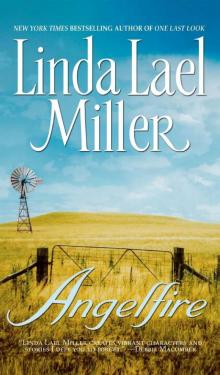 Angelfire
Angelfire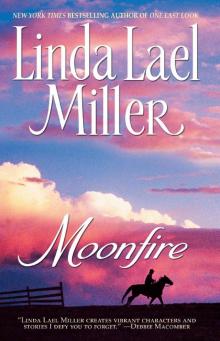 Moonfire
Moonfire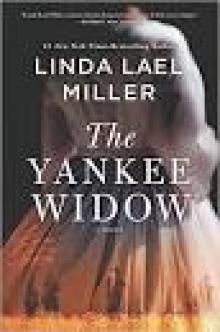 The Yankee Widow
The Yankee Widow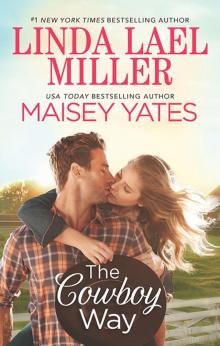 The Cowboy Way
The Cowboy Way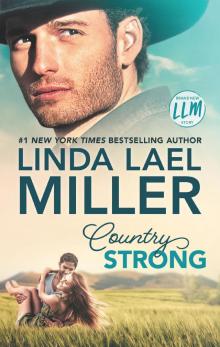 Country Strong--A Novel
Country Strong--A Novel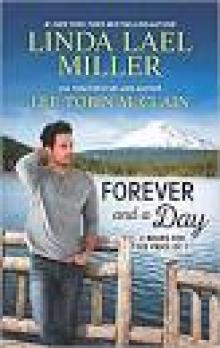 Forever and a Day
Forever and a Day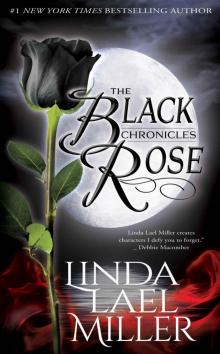 The Black Rose Chronicles
The Black Rose Chronicles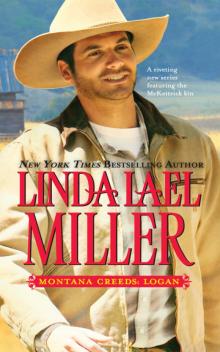 Montana Creeds: Logan
Montana Creeds: Logan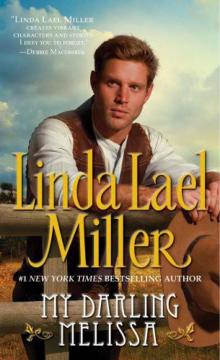 My Darling Melissa
My Darling Melissa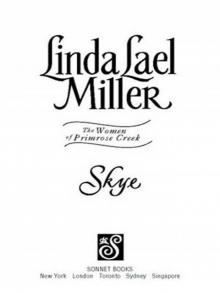 Skye
Skye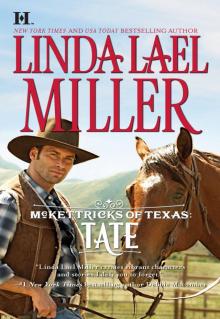 McKettricks of Texas: Tate
McKettricks of Texas: Tate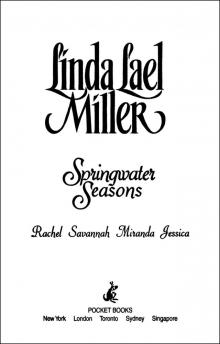 Springwater Seasons
Springwater Seasons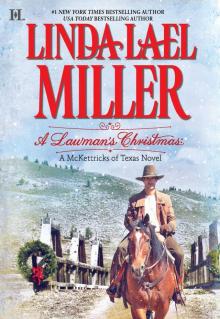 A Lawman's Christmas
A Lawman's Christmas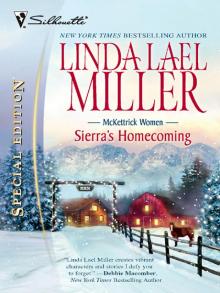 Sierra's Homecoming
Sierra's Homecoming![Parable, Montana [4] Big Sky Summer Read online](http://i1.bookreadfree.com/i/03/22/parable_montana_4_big_sky_summer_preview.jpg) Parable, Montana [4] Big Sky Summer
Parable, Montana [4] Big Sky Summer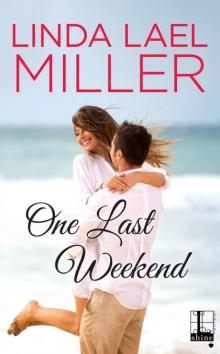 One Last Weekend
One Last Weekend A Stone Creek Collection, Volume 2
A Stone Creek Collection, Volume 2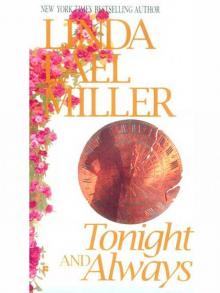 Tonight and Always
Tonight and Always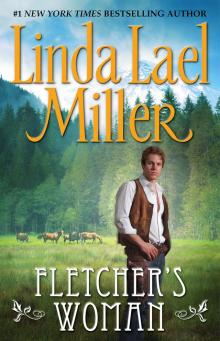 Fletcher's Woman
Fletcher's Woman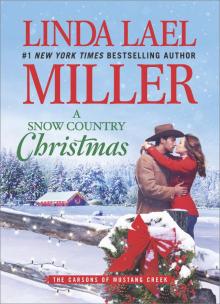 A Snow Country Christmas
A Snow Country Christmas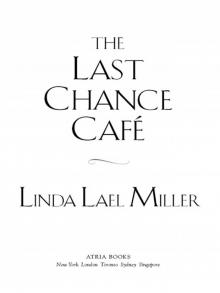 The Last Chance Cafe
The Last Chance Cafe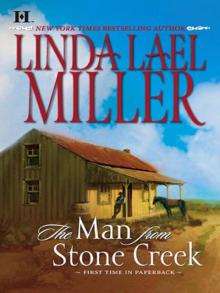 The Man from Stone Creek
The Man from Stone Creek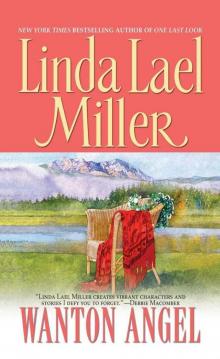 Wanton Angel
Wanton Angel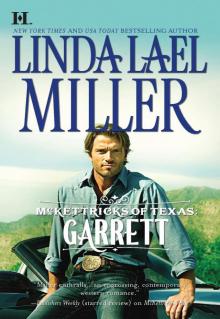 McKettricks of Texas: Garrett
McKettricks of Texas: Garrett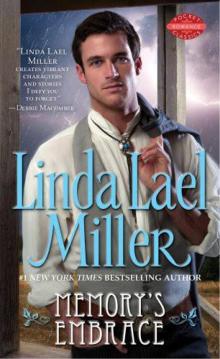 Memory's Embrace
Memory's Embrace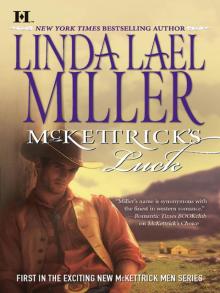 McKettrick's Luck
McKettrick's Luck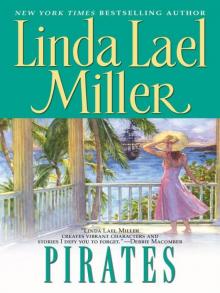 Pirates
Pirates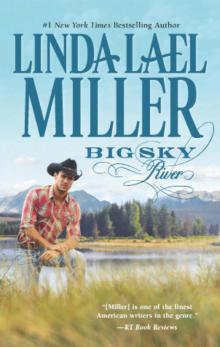 Big Sky River
Big Sky River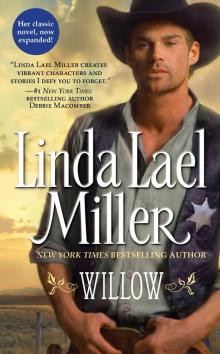 Willow: A Novel (No Series)
Willow: A Novel (No Series)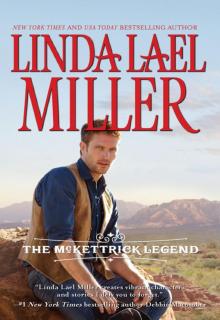 The McKettrick Legend: Sierra's HomecomingThe McKettrick Way (Hqn)
The McKettrick Legend: Sierra's HomecomingThe McKettrick Way (Hqn)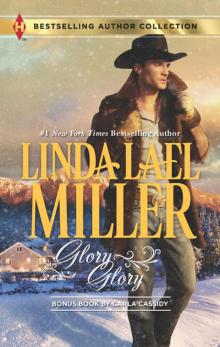 Glory, Glory: Snowbound with the Bodyguard
Glory, Glory: Snowbound with the Bodyguard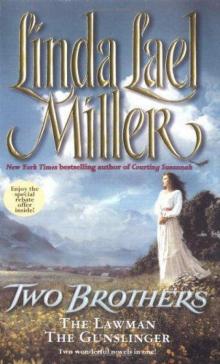 Two Brothers
Two Brothers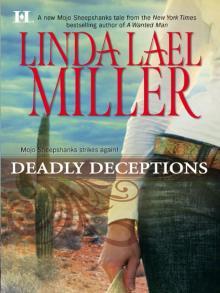 Deadly Deceptions
Deadly Deceptions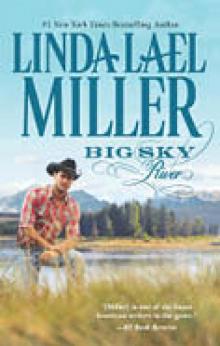 Big Sky Secrets
Big Sky Secrets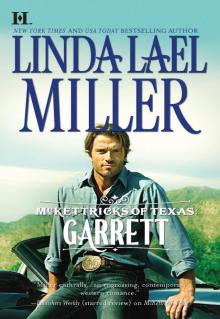 Garrett
Garrett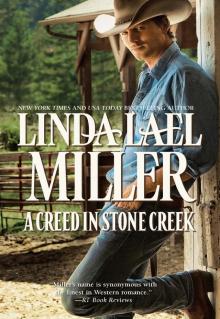 A Creed in Stone Creek
A Creed in Stone Creek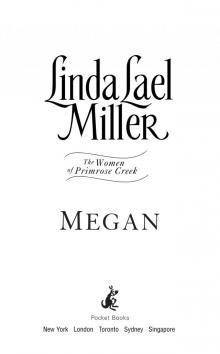 Megan
Megan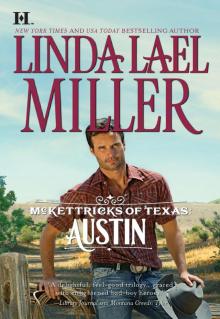 McKettricks of Texas: Austin
McKettricks of Texas: Austin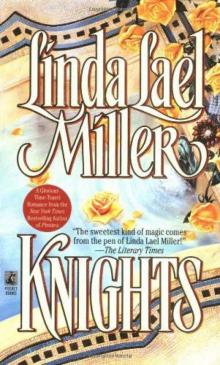 Knights
Knights High Country Bride
High Country Bride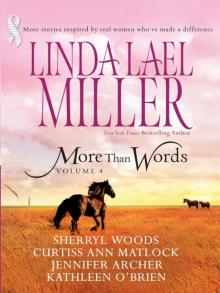 More Than Words Volume 4
More Than Words Volume 4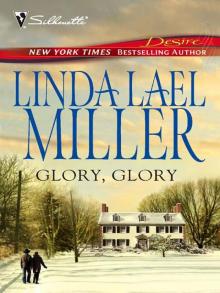 Glory, Glory
Glory, Glory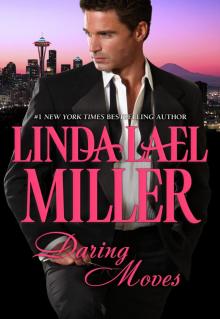 Daring Moves
Daring Moves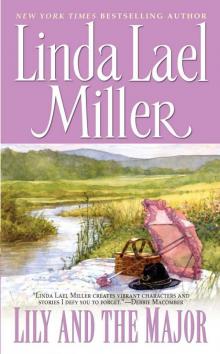 Lily and the Major
Lily and the Major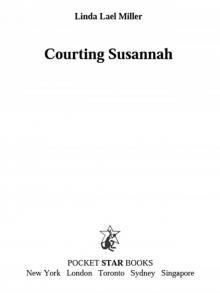 Courting Susannah
Courting Susannah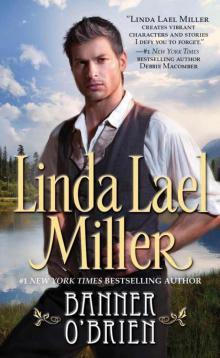 Banner O'Brien
Banner O'Brien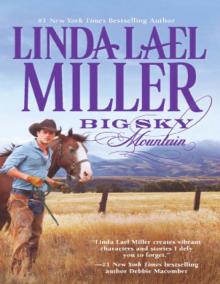 Big Sky Mountain
Big Sky Mountain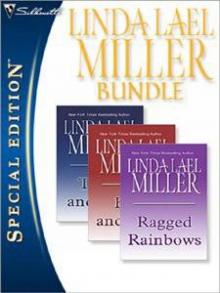 Linda Lael Miller Bundle
Linda Lael Miller Bundle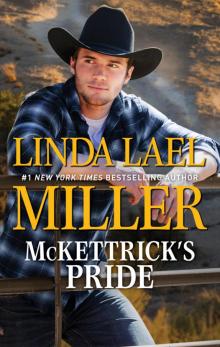 McKettrick's Pride
McKettrick's Pride A Stone Creek Collection Volume 1
A Stone Creek Collection Volume 1 A Wanted Man
A Wanted Man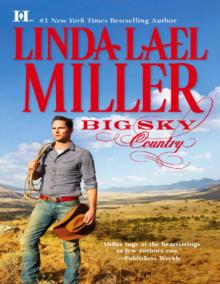 Big Sky Country
Big Sky Country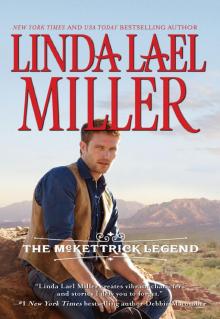 The McKettrick Legend
The McKettrick Legend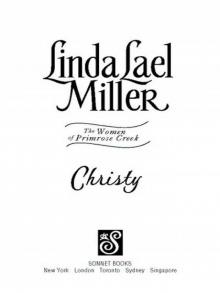 Christy
Christy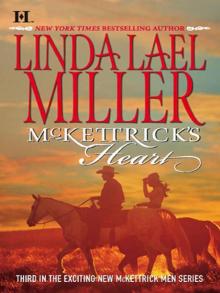 McKettrick's Heart
McKettrick's Heart Resurrection
Resurrection Arizona Heat
Arizona Heat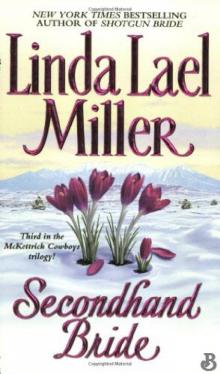 Secondhand Bride
Secondhand Bride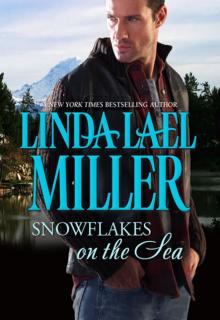 Snowflakes on the Sea
Snowflakes on the Sea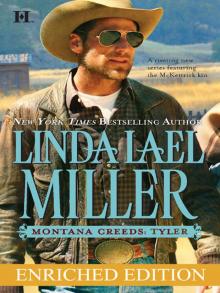 Montana Creeds: Tyler
Montana Creeds: Tyler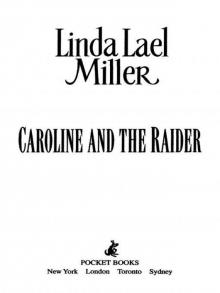 CAROLINE AND THE RAIDER
CAROLINE AND THE RAIDER A Proposal for Christmas: State SecretsThe Five Days of Christmas
A Proposal for Christmas: State SecretsThe Five Days of Christmas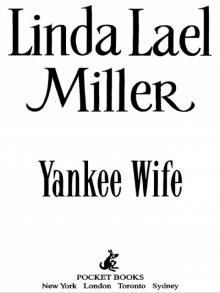 Yankee Wife
Yankee Wife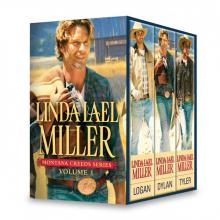 Linda Lael Miller Montana Creeds Series Volume 1: Montana Creeds: LoganMontana Creeds: DylanMontana Creeds: Tyler
Linda Lael Miller Montana Creeds Series Volume 1: Montana Creeds: LoganMontana Creeds: DylanMontana Creeds: Tyler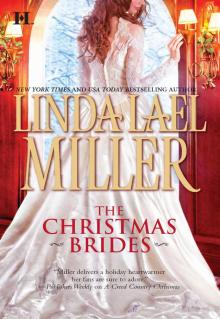 The Christmas Brides
The Christmas Brides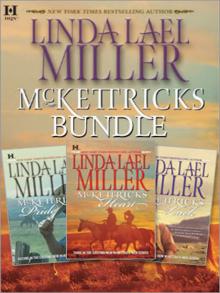 McKettricks Bundle
McKettricks Bundle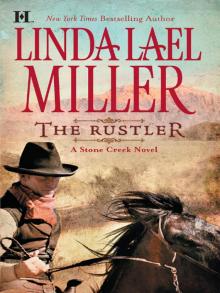 The Rustler
The Rustler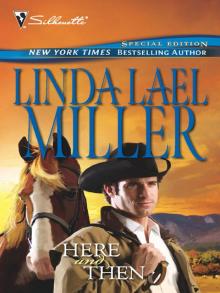 Here and Then
Here and Then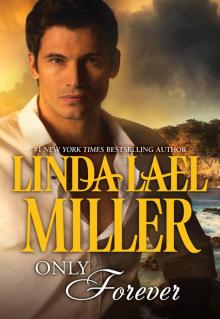 Only Forever
Only Forever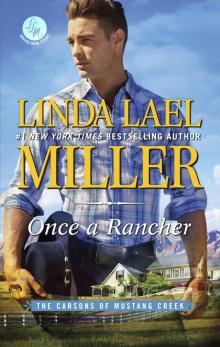 Once a Rancher
Once a Rancher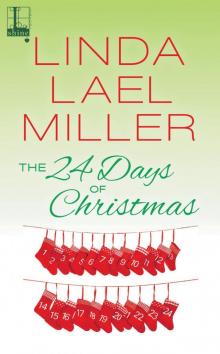 The 24 Days of Christmas
The 24 Days of Christmas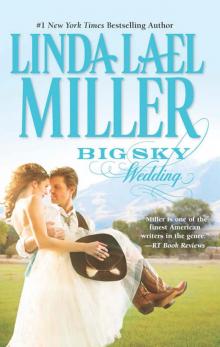 Big Sky Wedding
Big Sky Wedding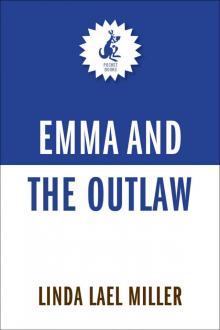 Emma and the Outlaw
Emma and the Outlaw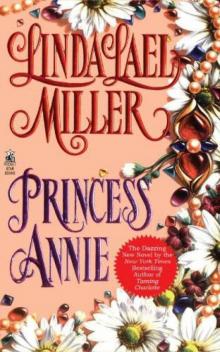 Princess Annie
Princess Annie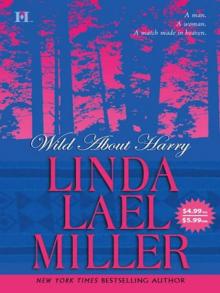 Wild About Harry
Wild About Harry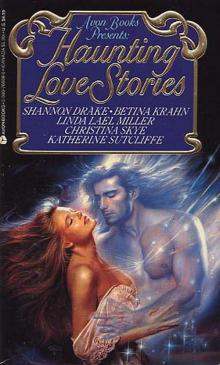 That Other Katherine
That Other Katherine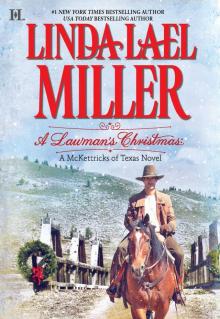 A Lawman's Christmas: A McKettricks of Texas Novel
A Lawman's Christmas: A McKettricks of Texas Novel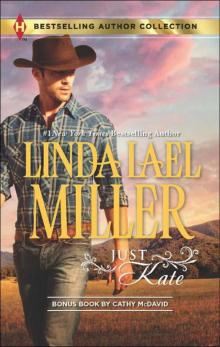 Just Kate: His Only Wife (Bestselling Author Collection)
Just Kate: His Only Wife (Bestselling Author Collection)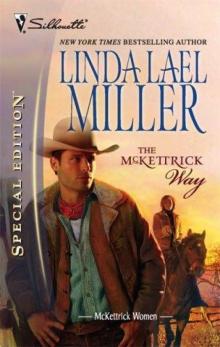 The McKettrick Way
The McKettrick Way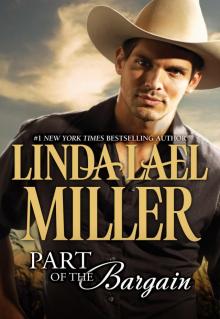 Part of the Bargain
Part of the Bargain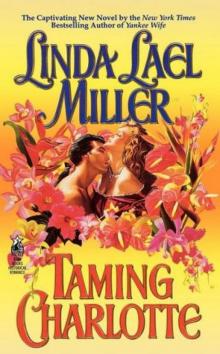 Taming Charlotte
Taming Charlotte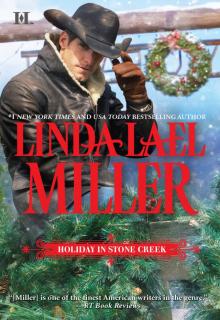 Holiday in Stone Creek
Holiday in Stone Creek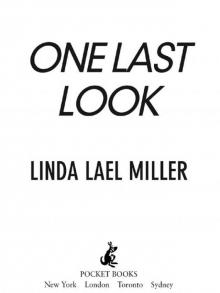 One Last Look
One Last Look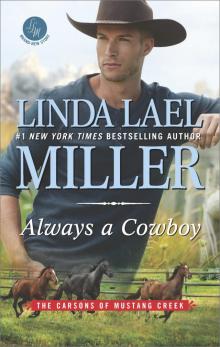 Always a Cowboy
Always a Cowboy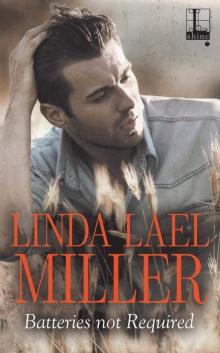 Batteries Not Required
Batteries Not Required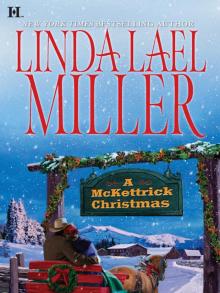 A McKettrick Christmas
A McKettrick Christmas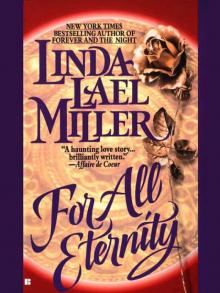 For All Eternity
For All Eternity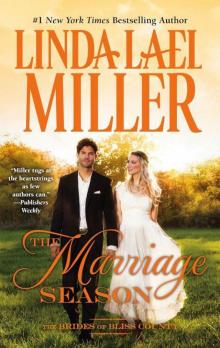 The Marriage Season
The Marriage Season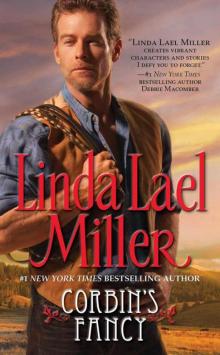 Corbin's Fancy
Corbin's Fancy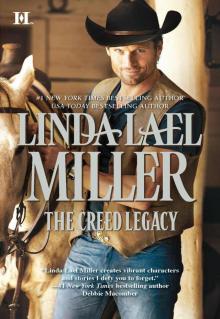 The Creed Legacy
The Creed Legacy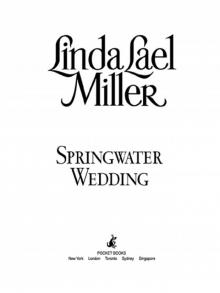 Springwater Wedding
Springwater Wedding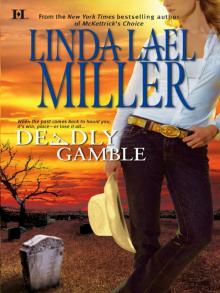 Deadly Gamble
Deadly Gamble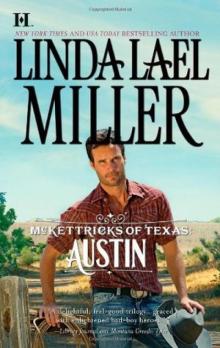 Austin
Austin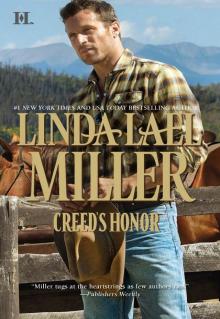 Creed's Honor
Creed's Honor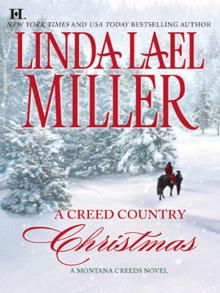 A Creed Country Christmas
A Creed Country Christmas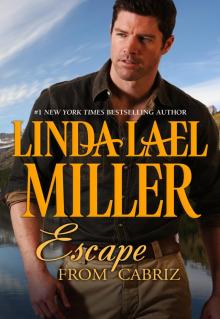 Escape from Cabriz
Escape from Cabriz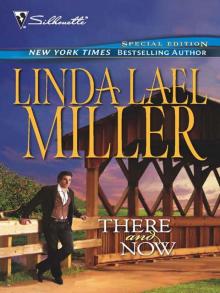 There and Now
There and Now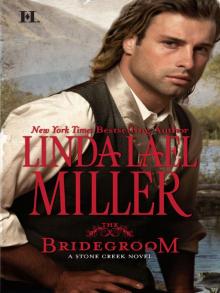 The Bridegroom
The Bridegroom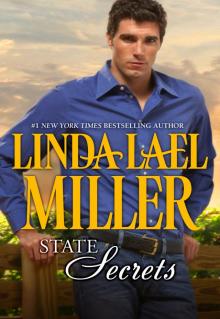 State Secrets
State Secrets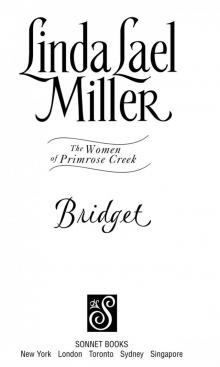 Bridget
Bridget